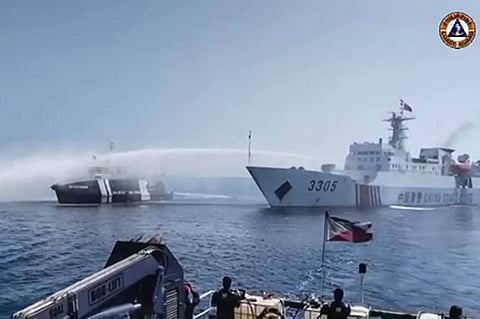
- NEWS
- the EDIT
- COMMENTARY
- BUSINESS
- LIFE
- SHOW
- ACTION
- GLOBAL GOALS
- SNAPS
- DYARYO TIRADA
- MORE

Philippine Coast Guard (PCG) chief Admiral Ronnie Gil Gavan stressed that water cannons aboard maritime vessels must only be used to save lives as he urged other countries to stop using them to attack fellow coast guards.
Gavan touched on the use of water cannons during his speech in a recently concluded special session on Maritime Law Enforcement and Confidence Building at the 21st Shangri-La Dialogue in Singapore.
“The use of water cannons against fellow coast guards, well obviously, it doesn’t look good. There is this proportionality in the use of force vis-à-vis the political message it sends. So, we’re not very comfortable with that, so I hope that stops,” he said.
While China Coast Guard officials were present in the session, Gavan did not particularly mention which Coast Guard units or from which countries have been using water cannons to attack PCG units.
Nonetheless, the Philippine government, through its Department of Foreign Affairs, had filed numerous official complaints against Beijing for its coast guard’s use of water cannons and “dangerous maneuvers” against the PCG.
Those protests centered on China Coast Guard actions against PCG vessels, particularly at Ayungin (Second Thomas) Shoal, where the ship BRP Sierra Madre was grounded as a Philippine military outpost.
“The PCG finds moral strength in following what several fora have found to be among the most legally compliant and humane rules on the use of force,” Gavan said.
He stressed the PCG remains steadfastly professional, patient, and respectful and “that its fitted water cannons, or more properly called fire monitors or ships, are not meant to light up the fire.”
“They are there to save lives and property from fire or simply to put off fire. Never to hose down one to pieces to start a fire,” he added. “This is how we exist and intend to live our role for our country and the rest of the global users of the WPS/SCS.”
Gavan pointed out that the international community recognized the challenges being faced by the Philippines over its territorial claims in the South China Sea.
“We just have to go back to the basics of humanity. If we embrace together what is right, we won’t be wrong,” he said.
In the same forum, Ge Henwen from Beijing said Chinese fishermen also experienced water cannon attacks from Japan, noting that they are not the first country to use such force.
“If I’m not wrong, the Japanese Coast Guard was the first one who use water cannons toward Chinese fishing boats and fishermen. Maybe everyone, you can find hundreds of pictures in the Internet from the 1990s to 2000s, 2010s,” he said.
The Chinese official emphasized the need for dialogue in handling territorial disputes.
“It’s better for us to sit down and talk and negotiate under the framework of the United Nations Convention on the Law of the Sea instead of unilaterally sending military or semi-military personnel to intrude into the Rén’ài Jiāo,” Ge said, referring to the increasing tension in the Ayungin Shoal.
The change in the Philippine government’s foreign policy “has resulted in the increase of tension in the region,” he added.
On the other hand, Gavan said the United States and Japan have expressed willingness to conduct joint maritime sails with the Philippines.
“Even without these developments, the United States Coast Guard and Japan Coast Guard have been in talks with us on how they can help us better perform our role. I think talks are underway on how we can do things better,” he said.
